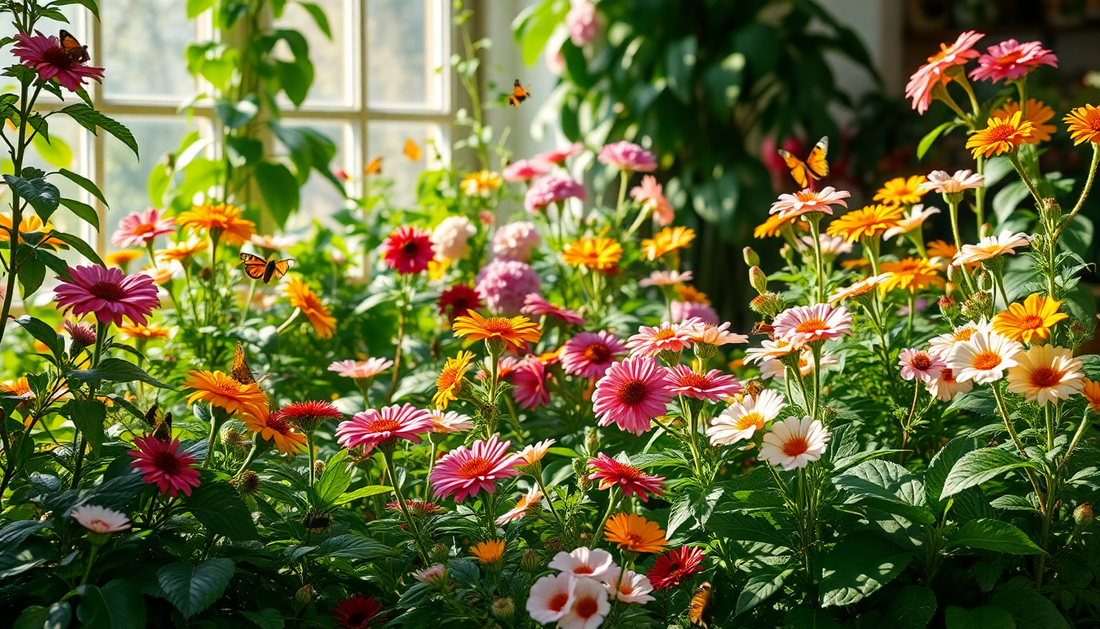
Bring the Buzz Indoors: 10 Pollinator-Friendly Indoor Plants
In today's fast-paced world, where we spend the majority of our time indoors, it's easy to forget the importance of pollinators and their role in maintaining a healthy ecosystem. However, with a little bit of creativity and the right indoor plants, you can bring the buzz of nature right into your own home.
Introducing Idyl, your one-stop-shop for all your gardening needs in Bangalore. At Idyl, we believe that everyone should have the opportunity to enjoy the beauty and benefits of nature, even in the confines of their own living spaces. That's why we've curated a collection of the best pollinator-friendly indoor plants that will not only add a touch of life to your home but also help support the vital work of bees, butterflies, and other pollinators.
The Importance of Pollinators Indoors
Pollinators play a crucial role in the health of our ecosystems, responsible for the reproduction of over 75% of the world's flowering plants. While we often associate pollinators with the great outdoors, their importance extends to our indoor environments as well. By incorporating pollinator-friendly plants into your home, you can help create a haven for these essential creatures, providing them with the nectar and pollen they need to thrive.
Moreover, the presence of pollinators in your indoor spaces can have a positive impact on your own well-being. Studies have shown that interacting with nature, even in small ways, can reduce stress, improve mood, and boost overall mental health. By inviting pollinators into your home, you're not only supporting the environment but also enhancing your own quality of life.
10 Pollinator-Friendly Indoor Plants
At Idyl, we've carefully selected 10 indoor plants that are not only beautiful but also highly attractive to pollinators. Whether you have a sunny windowsill or a cozy corner, these plants will bring the buzz of nature right into your living space.
1. Lavender (Lavandula)
Lavender is a classic choice for indoor gardening, known for its calming aroma and stunning purple blooms. This hardy plant is a magnet for bees and butterflies, providing them with a rich source of nectar and pollen. Lavender thrives in well-draining soil and requires moderate sunlight, making it an excellent option for both apartments and homes.
2. Rosemary (Rosmarinus officinalis)
Rosemary is not only a fragrant herb with culinary uses but also a pollinator-friendly plant. Its delicate blue flowers are irresistible to bees, who are drawn to the plant's abundant nectar. Rosemary prefers a sunny spot and well-draining soil, making it a low-maintenance addition to your indoor garden.
3. Sage (Salvia)
Sage is a versatile plant that comes in a variety of colors, from deep purple to vibrant red. Its nectar-rich flowers are a favorite among hummingbirds, bees, and butterflies. Sage thrives in bright, indirect light and requires well-draining soil, making it a perfect choice for indoor gardening.
4. Basil (Ocimum basilicum)
Basil is not only a culinary staple but also a pollinator-friendly plant. Its small, white flowers are irresistible to bees, who are drawn to the plant's sweet nectar. Basil prefers a sunny spot and moist, well-draining soil, making it an easy-to-grow addition to your indoor garden.
5. Thyme (Thymus)
Thyme is a hardy, drought-tolerant herb that produces small, purple flowers that are highly attractive to bees and other pollinators. This low-growing plant thrives in well-draining soil and requires moderate sunlight, making it a great choice for indoor gardening.
6. Marigold (Tagetes)
Marigolds are not only vibrant and cheerful but also a magnet for pollinators. Their pungent aroma and bright yellow or orange flowers are irresistible to bees and butterflies. Marigolds prefer full sun and well-draining soil, making them a perfect addition to your indoor garden.
7. Sunflower (Helianthus)
While sunflowers are often associated with outdoor gardens, there are dwarf varieties that can thrive indoors. These cheerful plants produce large, nectar-rich flowers that are a favorite among pollinators. Sunflowers require ample sunlight and well-draining soil, making them a rewarding addition to your indoor gardening space.
8. Nasturtium (Tropaeolum)
Nasturtiums are a versatile and eye-catching plant that can be grown both indoors and outdoors. Their vibrant, trumpet-shaped flowers are a magnet for hummingbirds, bees, and butterflies. Nasturtiums prefer well-draining soil and partial shade, making them a great choice for indoor gardening.
9. Borage (Borago officinalis)
Borage is a hardy, self-seeding plant that produces beautiful, star-shaped blue flowers. These flowers are a rich source of nectar for bees and other pollinators. Borage thrives in well-draining soil and requires moderate sunlight, making it a low-maintenance addition to your indoor garden.
10. Mint (Mentha)
Mint is a versatile and fast-growing herb that is not only useful in the kitchen but also attractive to pollinators. Its small, purple flowers are a favorite among bees and butterflies. Mint prefers moist, well-draining soil and partial shade, making it a great choice for indoor gardening.
Bringing the Buzz Indoors
At Idyl, we believe that everyone should have the opportunity to enjoy the beauty and benefits of nature, even in the confines of their own living spaces. By incorporating these pollinator-friendly indoor plants into your home, you'll not only create a visually stunning and fragrant environment but also contribute to the well-being of our essential pollinators.
Whether you're an experienced gardener or a beginner, Idyl has everything you need to get started. From high-quality plants and fertilizers to expert gardening services, we're here to help you transform your indoor space into a thriving, pollinator-friendly oasis.
So why wait? Visit Idyl today and let us help you bring the buzz of nature right into your home.







No comments